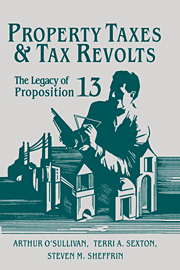Book contents
- Frontmatter
- Contents
- List of tables, figures, and boxes
- Preface
- 1 The context and significance of tax revolts
- 2 The diversity of property tax systems
- 3 The simple analytics of an acquisition-value tax system
- 4 Measuring the disparities
- 5 Incidence, mobility, ownership, and capitalization
- 6 Tax limitation and local government
- 7 Revenue projections and policy alternatives
- 8 The future of the property tax
- Notes
- References
- Index
8 - The future of the property tax
Published online by Cambridge University Press: 21 March 2010
- Frontmatter
- Contents
- List of tables, figures, and boxes
- Preface
- 1 The context and significance of tax revolts
- 2 The diversity of property tax systems
- 3 The simple analytics of an acquisition-value tax system
- 4 Measuring the disparities
- 5 Incidence, mobility, ownership, and capitalization
- 6 Tax limitation and local government
- 7 Revenue projections and policy alternatives
- 8 The future of the property tax
- Notes
- References
- Index
Summary
The property tax is one of the least popular taxes. The public's hostility is bred by a number of factors, including difficulties in determining the true market value of property, general antipathy to taxes based on wealth, and sudden changes in the relative burden of property taxes. Voters have translated their feelings toward the property tax into a variety of property tax limitations across the country. Some limitations just affect the rates that can be levied. These constrain revenue but do not fundamentally alter the nature of the tax. Other limitations affect the base of the tax. These can take two forms. First, as in Massachusetts, there can be overall limits to the growth in the tax base. Second, many jurisdictions classify property, that is, assess different types of property at different percentages of market value with the result that property within the state is taxed at differential rates. The most radical change in the nature of the tax occurred in California (and recently in Florida) where property taxes based on market value were replaced with taxes based on acquisition value.
Why do property tax revolts occur? From the review of four key property tax revolts in Chapter 1, it is clear that taxpayer revolts can occur in different contexts. One of the major precipitating factors is a sudden change in the relative burden of property taxation. During the Great Depression this occurred as incomes fell dramatically and property taxes failed to decline, so that the relative burden increased. In California during the late 1970s, rapid inflation and a deadlocked political system were the culprits that increased the burden of taxation relative to income, especially for homeowners.
- Type
- Chapter
- Information
- Property Taxes and Tax RevoltsThe Legacy of Proposition 13, pp. 136 - 145Publisher: Cambridge University PressPrint publication year: 1995



